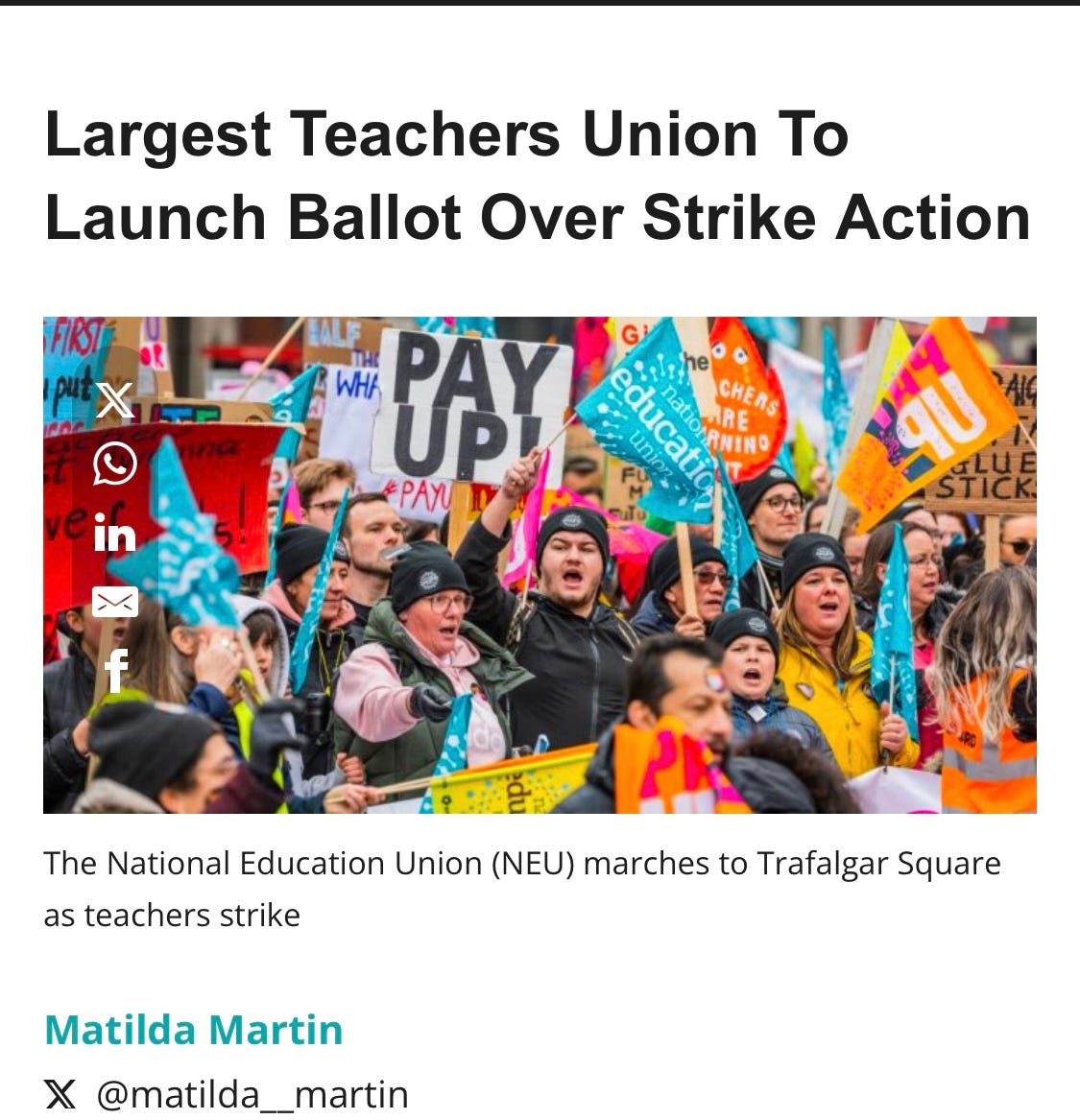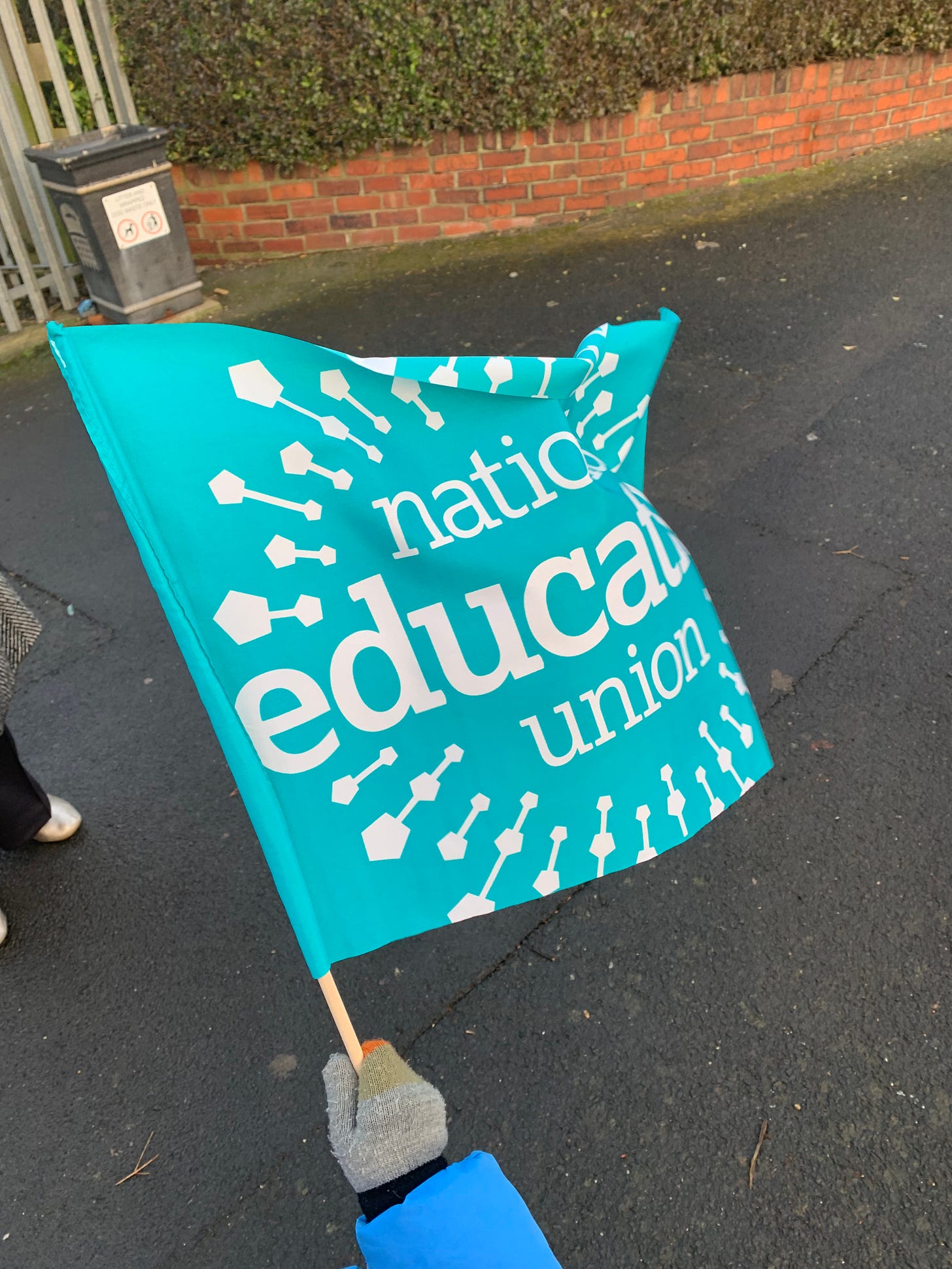The teachers' pay ballot is not 'extraordinary' at all
Fair pay for teaching, no cuts for schools
According to the Department for Education, the fact that the National Education Union is to conduct an indicative ballot of teachers over possible industrial action on pay and school funding ‘is an extraordinary decision.’ But far from being extraordinary, it was highly likely, indeed inevitable, and certainly entirely justified. Through the economic and political choices made in Downing Street the government has set itself up on a collision course with millions of people, including now over public sector pay and funding for public services.

The Labour government has recommended a pay award of 2.8 per cent in its submission of evidence for the 2025 public sector pay round, affecting millions of workers including teachers, nurses and civil servants. And it has made clear that any pay rises must be funded from within existing budgets. As the political editor of the Times, Stephen Swinford, correctly predicted last month, ‘it will inevitably lead to clashes between the unions and the government.’ Trade union reaction was swift and negative. Unite’s Sharon Graham described it as ‘an insult to dedicated NHS staff and further evidence that the pay review body is broken beyond repair.’ The Royal College of Nursing said the government was telling nursing staff that ‘they are worth as little as £2 extra a day, less than the price of a coffee,’ and that nursing was in crisis with ‘fewer joining and too many experienced professionals leaving.’ So fundamental is the relationship between pay and the recruitment-retention crisis in the NHS that it was the common theme of trade union responses after the launch of Wes Streeting’s health service reforms this month. Similarly, with the teachers, ITV’s Robert Peston wrote of the government’s pay recommendation: ‘there is very little chance, on a settlement of that magnitude, that the chronic shortage of teachers and teaching assistants will be remedied.’
In response to the pay recommendation, four teaching unions issued a submission to education secretary Bridget Phillipson setting out their common view that the recommendation on pay will further damage recruitment and retention in England.
In pushing back against the union response, the government has pointed to recent pay rises. But when the last pay award was announced the NEU was clear that that was a step on the road towards pay restoration after years of wages falling behind, not the end of the process. The IFS has estimated that even after the last pay settlement, the pay of experienced teachers will be around 9 per cent lower in real terms than in 2010.
Purely on pay alone, the union response alone is far from extraordinary.
But the fact that the pay recommendation is unfunded, ie it comes with no commitment for additional funding, means it will push the burden of paying for any settlement onto the existing costs of the public services affected. As such, Labour’s position is both provocative and a very serious political error, since most of these public services are already extremely hard-pressed. In terms of schools, the unions emphasise the government’s expectation that schools will not be able to fund a pay award without making ‘efficiencies.’ The Stop School Cuts campaign argues that the tightness of school budgets means ‘efficiencies’ will translate into cuts: seven in ten schools have less real-terms funding than in 2010 and for many schools there is nothing left to trim. Daniel Kebede, general secretary of the National Education Union, has said the situation means 99 per cent of secondary schools will have to make cuts. School costs are rising by 3.4 per cent whilst school funding is going up by 2.2 per cent; an unfunded pay award will lead to cuts at a time when only 3 per cent of primary and 6 per cent of secondary schools feel financially secure.
So the NEU’s decision to hold an indicative ballot is not extraordinary at all: it has been making its position clear for some time, based on a rational view of both pay and school cuts.
But whilst the DfE is the department tasked with driving home the pay position in schools, it is necessary to emphasise that this an overall government policy flowing from the economic choices of Keir Starmer and Rachel Reeves, not one limited to teaching.
Labour’s economic framework was bound to generate a host of tensions and conflicts with its own base, as has been argued here before. Labour’s domestic problems flow overwhelmingly from the Labour right’s economic policy framework. This is the root cause of repeated ‘tough’ choices: rejection of the Waspi women, cancellation of the universal pensioners’ winter fuel payments, rising student fees, increased bus fares, retention of the two-child benefit cap, and so on – and so now with public sector pay. Spending on welfare in particular appears to be in the government’s sights.
Labour boxed itself in by refusing to raise necessary resources through taxation, relying on an argument that growth in the future will deliver a resolution to the country’s problems. Reeves and Starmer ruled out a range tax options - such as on profit, income and wealth that could have been used to prevent cuts and low investment. Reeves’s ‘stability’ rules on bringing current spending into balance are extremely tight and will lead to cuts. Reeves is said to be pushing Cabinet colleagues for more ideas to encourage growth, whilst simultaneously lining up cuts for her spring fiscal event. Today, Keir Starmer said the government would be ‘ruthless’ as his government prepares the ground for a new round of spending cuts.
School cuts based on an unfunded approach to teachers’ pay are a grim indication of the economics of the Labour right. Central government investment is set to fall by the end of this parliament, and the government’s own projections have growth at low levels across the next five years. At the same time there is pressure for more to be spent on military expenditure.
If union members opt to strike over the pay awards the argument over the Labour leadership’s economic approach will enter a new and more intense phase. Likewise, with the cuts coming down the line.
So, one - solidarity with all trade unionists opposing an unfunded pay cut, and solidarity with NEU members if they choose to strike. Any union is deserving of support for a decent pay settlement, one that is not accompanied by cuts.
And two - a much sharper fight over the government’s wrong economic choices is needed in society as a whole to counter pressure from the right, and in the labour movement specifically.




